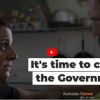ACTU launches TV campaign commercials
The ACTU has launched a 30-second advertisement showing a couple worried about overdue bills who try to comfort each other, while their son struggles to do his homework in the family's living area.
"We're in a cost of living crisis," the narrator says. "Under Scott Morrison, real wages have flat-lined and last year, for the average worker, real wages actually went backwards – over $800. "But the cost of living is skyrocketing.









